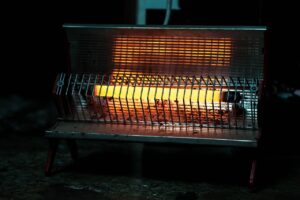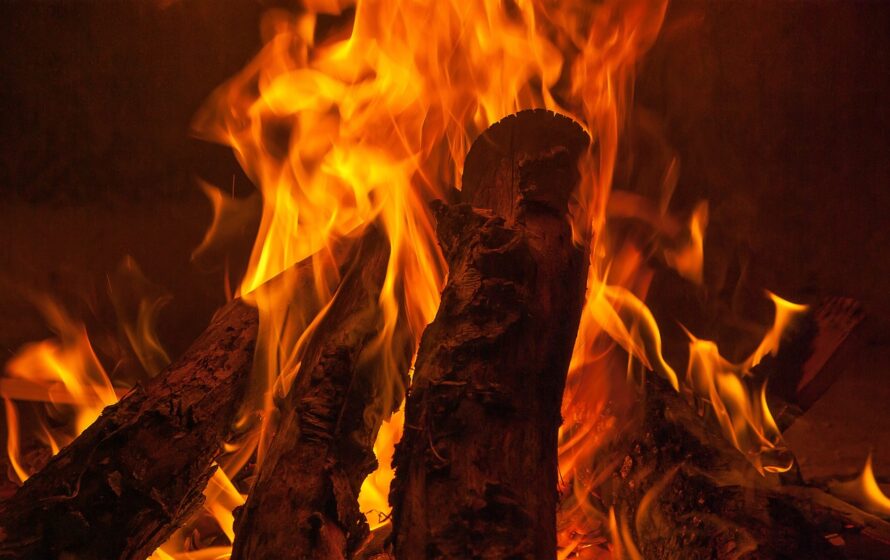Reliable Heat Sources for Emergency Situations
Finding reliable sources of heat becomes a primary concern during emergencies. Without adequate heating options, there is a risk of exposure to extreme cold weather conditions, which can lead to hypothermia, frostbite, and even death.
Here are 4 heating solutions to consider:
Portable Propane or Butane Stoves
One of the most reliable heat sources for emergency situations is a portable propane heater. These heaters are easy to use, lightweight, and provide heat without requiring electricity or an open flame.
You need to have a fuel source that will allow you to boil water and cook whole meals as well as simple foods. If you have little children, especially babies or toddlers, you’ll need that fuel source to prepare things like bottles of formula and warm foods.
When considering which stove to get, always go with the one that’s the lightest weight but highest performing stove. Also, look for one that has a wind shield as well as one that closes for quick shutdown.
One of the biggest advantages of portable propane or butane stoves is that they are easy to use and require minimal preparation. They offer a reliable and consistent source of heat and can be used to cook a variety of food items. They are also lightweight and compact, making them easy to carry and transport. Another advantage is that they emit fewer pollutants and have a lower risk of starting a fire than traditional campfires.
These stoves offer many advantages over traditional campfires and provide a quick and easy way to cook meals. But like any product, there are also a few drawbacks to consider.
On the downside, they require fuel which can be expensive and can add weight to your backpack. In addition, propane or butane stoves may not work well in extremely cold temperatures, as the fuel may not vaporize properly.
Wood Stoves as Emergency Heat Sources
 Wood stoves can be a good choice if you can stay in your home during an emergency. They can be incredibly efficient in keeping a space warm for extended periods. Additionally, they are perfect for rural areas for those who have a sufficient supply of firewood.
Wood stoves can be a good choice if you can stay in your home during an emergency. They can be incredibly efficient in keeping a space warm for extended periods. Additionally, they are perfect for rural areas for those who have a sufficient supply of firewood.
There are several benefits to using wood stoves as emergency heat sources. For one, they are highly efficient, as they are fueled by renewable resources such as wood. This means they can save homeowners money on energy bills in the long run. Additionally, wood stoves provide a steady and consistent heat source that can help prevent frozen pipes and other damage caused by extremely cold temperatures.
There are also some cons to consider. One potential drawback is that they require a significant investment of time and effort to operate effectively. Homeowners must be prepared to buy or chop and gather firewood, maintain the stove, and ensure proper ventilation to prevent indoor air pollution.
Solar-Powered Heaters or Ovens
The primary advantage of solar-powered heaters or ovens is that they offer an environmentally-friendly option for heating or cooking. This technology harnesses the energy from the sun, which is a renewable resource that produces no harmful emissions. Additionally, they can help you save money on your electricity bills, as you won’t need to rely on traditional energy sources.
However, there are some drawbacks to consider before investing in these heaters. One of the main limitations is that they depend on the availability of sunlight. This means that in areas with limited sunlight, it may not be the most efficient method of heating or cooking. Additionally, the upfront costs of purchasing and installing a solar-powered heater or oven can be expensive, which may not be feasible for everyone.
Generator-Powered Electric Heater
D epending on your circumstances, another reliable option is a generator-powered electric heater. It is a smart and convenient solution to ensure uninterrupted warmth in your living space. This technology combines the power of a generator with the convenience of an electric heater, allowing you to stay warm even in the event of a power outage.
epending on your circumstances, another reliable option is a generator-powered electric heater. It is a smart and convenient solution to ensure uninterrupted warmth in your living space. This technology combines the power of a generator with the convenience of an electric heater, allowing you to stay warm even in the event of a power outage.
With this heating system, you can stay cozy and comfortable during cold winter nights. These can be used in areas with access to gasoline or diesel fuel. They are safe and efficient, making them ideal for use during power outages or natural disasters.
Considerations for Choosing the Right Heat Source in Emergency Situations
Having the right heat source can mean the difference between life and death in a disaster or emergency. Selecting the most appropriate heat source can help provide warmth, cook food, and purify water. The choice of heat source should take into account several factors such as the availability of fuel, ease of use, speed of heating, and safety.
You also need to decide if you need a portable heat source or not. If you want to be prepared for surviving a disaster at home, the wood stove, solar heater, or generator-powered heater are great options. If you think you may need to bug out, then also look at the portable stoves.
Ease of use is also a consideration when selecting a heat source for emergencies. Choosing one that is easy to operate and maintain can save time and effort. Portable stoves and heaters that are lightweight and compact are ideal for emergency situations, as they can be easily transported and used in different locations. The speed of heating is another factor to consider, especially in situations where there is a need to boil water quickly. In such cases, propane stoves, gas cookers, and jet boilers are ideal.
Safety is another factor to consider when choosing a heat source for emergencies. It is essential to select a heat source that has safety features such as automatic shut-off valves, carbon monoxide detectors, and stable bases. Kerosene heaters, for instance, should be used in well-ventilated areas to prevent carbon monoxide poisoning.
A little research and planning can go a long way in selecting the right heat source to keep you warm during disasters and other emergencies. By considering these factors, you can be sure that you are prepared for any emergency situation that may arise.
Read more here: The Final Survival Plan Review



